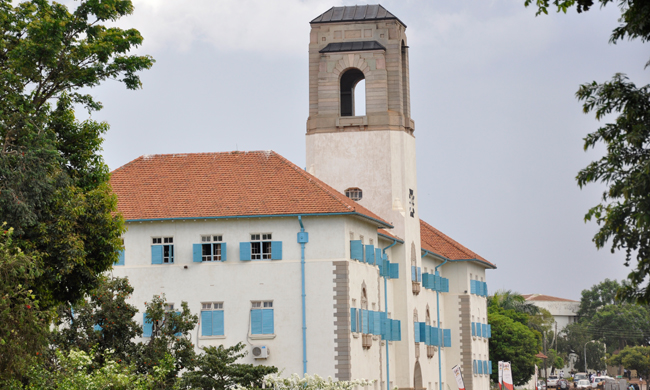Makerere University is currently governed by the Universities and Other Tertiary Institutions Act, 2001 (as amended) of the Republic of Uganda. The University, with the main campus located on Makerere Hill, has another Campus in Jinja Town and several affiliated institutions. Its enrolment currently stands at over 35,000 students in 245 Undergraduate and Postgraduate academic programmes in the sciences and humanities disciplines.
Makerere University is seeking applications from suitably qualified Ugandans to take up the position of the Second Deputy Vice-Chancellor. As a member of the University Executive,
reporting to the Vice-Chancellor, the Second Deputy Vice-Chancellor is expected, through influence and example, to help develop, lead and promote the University's Strategic Vision and to position Makerere University for the challenges of the next decade. This is a senior leadership position in one of the reputable institutions of higher learning in Africa with responsibility for overseeing academic strategy, planning and resourcing.
POSITION: SECOND DEPUTY VICE-CHANCELLOR (FINANCE AND ADMINISTRATION)
Role:
The Deputy Vice-Chancellor (Finance and Administration), will report to and assist the Vice-Chancellor in the performance of his or her functions and in that regard shall oversee the
finances and administration of the University and be responsible for the Planning and Development of the University.
Duties and Responsibilities
He/She shall be responsible for:
a) Effective leadership and management of University;
b) Effective mobilization and management of funds of the University;
c) Proper planning, budgeting and development of the University;
d) Implementation of investment policies and programmes of the University;
e) Overseeing Human Resource Management functions;
f) Responsible for security matters and University Estate;
g) Procurement matters; and
h) Perform other functions as may be delegated to him/her by the Vice-Chancellor or assigned by the University Council.
PERSONAL SPECIFICATIONS
Qualifications:
He/She should:
a) Hold a PhD or other academic Doctorate;
b) Be at least at the level of Associate Professor in an institution whose academic ranking is comparable with Makerere University or the applicant should be at a position two levels
below the policy-making organ;
c) Be at least of the Age range of 40 to 65 years at the time of application;
d) Be a Ugandan Citizen.
Experience:
Should have a minimum senior managerial experience of at least 5 years in a reputable academic/financial/ corporate/private institution;
Attributes:
(a) High level of maturity;
(b) Experience of strategic leadership and management in a reputable university or equivalent in government or reputable organization;
(c) Evidence of management in a large reputable organization and mobilization of funds;
(d) Membership to reputable professional associations and clubs;
(e) Must have people skills;
(f) Global outlook in Higher Education policy and environment;
(g) Must have excellent interpersonal skills and competencies;
(h) Demonstrate evidence of negotiation skills:
(i) Excellent communication skills and public relations:
(j) Demonstrate evidence of team leadership;
(k) Demonstrate evidence of ability to handle students community:
(I) Ability to comprehend and implement the strategic plan of the University;
(m) Good financial track record;
(n) Evidence of capacity to mobilize resources;
(o) Evidence of resource mobilization in the last five years;
(p) Evidence of involvement in leadership of investment projects; and
(q) Evidence of experience in planning and budgeting.
REMUNERATION:
An attractive remuneration package that is in accordance with University terms of service.
TENURE OF APPOINTMENT:
Five-year contract.
METHOD OF APPLICATION:
Interested candidates are invited to submit their application letters together with the following:
(1) A statement of motivation;
(2) Detailed and updated curriculum vitae signed and dated by the candidate;
(3) A written statement of interest not exceeding 1000 words about the candidate's vision for a competitive University in the 21st Century;
(4) Names and addresses of three (3) referees who should forward their reports directly to the Academic Registrar, Makerere University under Confidential Cover by 1.00 p.m. Friday 17th July 2020. Referees should attest the candidate's high academic credentials, managerial and financial capacity and integrity;
(5) Certified copies of academic transcripts and certificates; and
(6) Certified copies of the applicant's birth certificate or relevant pages of their Passports or National Identity card.
Sealed applications should be forwarded under confidential cover and reach the Office of the Academic Registrar not later than Friday 17th July, 2020 1.00 p.m. East African Time.
The envelopes should be clearly marked "APPLICATION FOR POSITION OF THE DEPUTY VICE-CHANCELLOR, FINANCE AND ADMINISTRATION" on the top right corner.
Applications sent by electronic media (e-mail) to search@acadreg.mak.ac.ug will also be accepted by Friday 17th July, 2020 1.00 p.m., provided the application has been duly
signed and scanned. Incomplete applications or applications received after the closing time will not be considered.
All applications should be addressed to:
The Academic Registrar
Makerere University,
P. O. Box 7062, Kampala, Uganda
Or E-Mail: search@acadreg.mak.ac.ug (used for this job Applications Only)
Or hand-delivered: At the 6th Floor Room 602, Senate Building, Makerere University.
For inquiries: Contact Landline Telephone number: + 256-414-534343/530231-2 (during working hours only).
Alfred Masikye Namoah
ACADEMIC REGISTRAR
Follow the link below for the signed copy of the advert

 General2 weeks ago
General2 weeks ago
 Natural Sciences2 weeks ago
Natural Sciences2 weeks ago
 Agriculture & Environment1 week ago
Agriculture & Environment1 week ago
 Health2 weeks ago
Health2 weeks ago
 General6 days ago
General6 days ago



